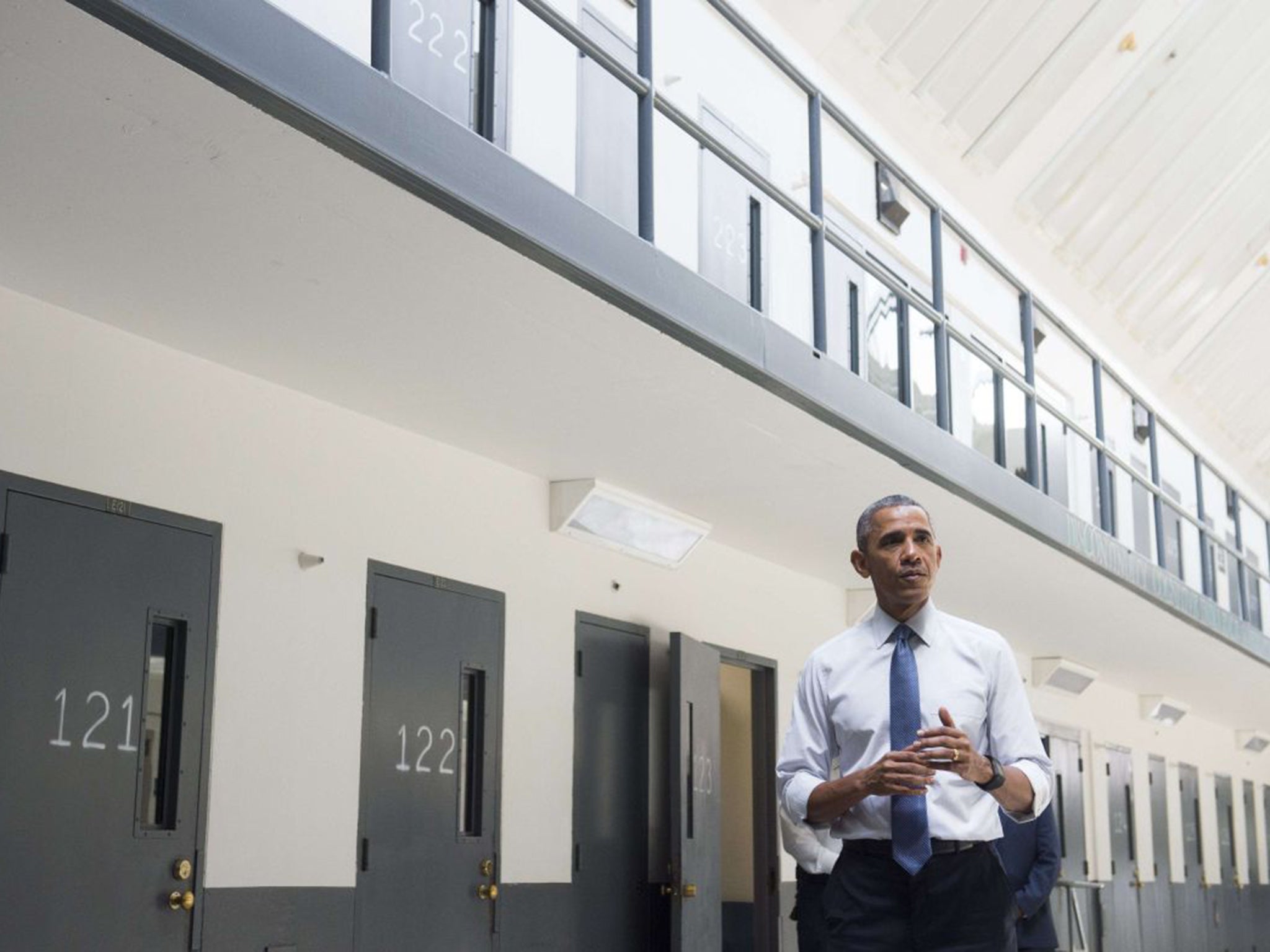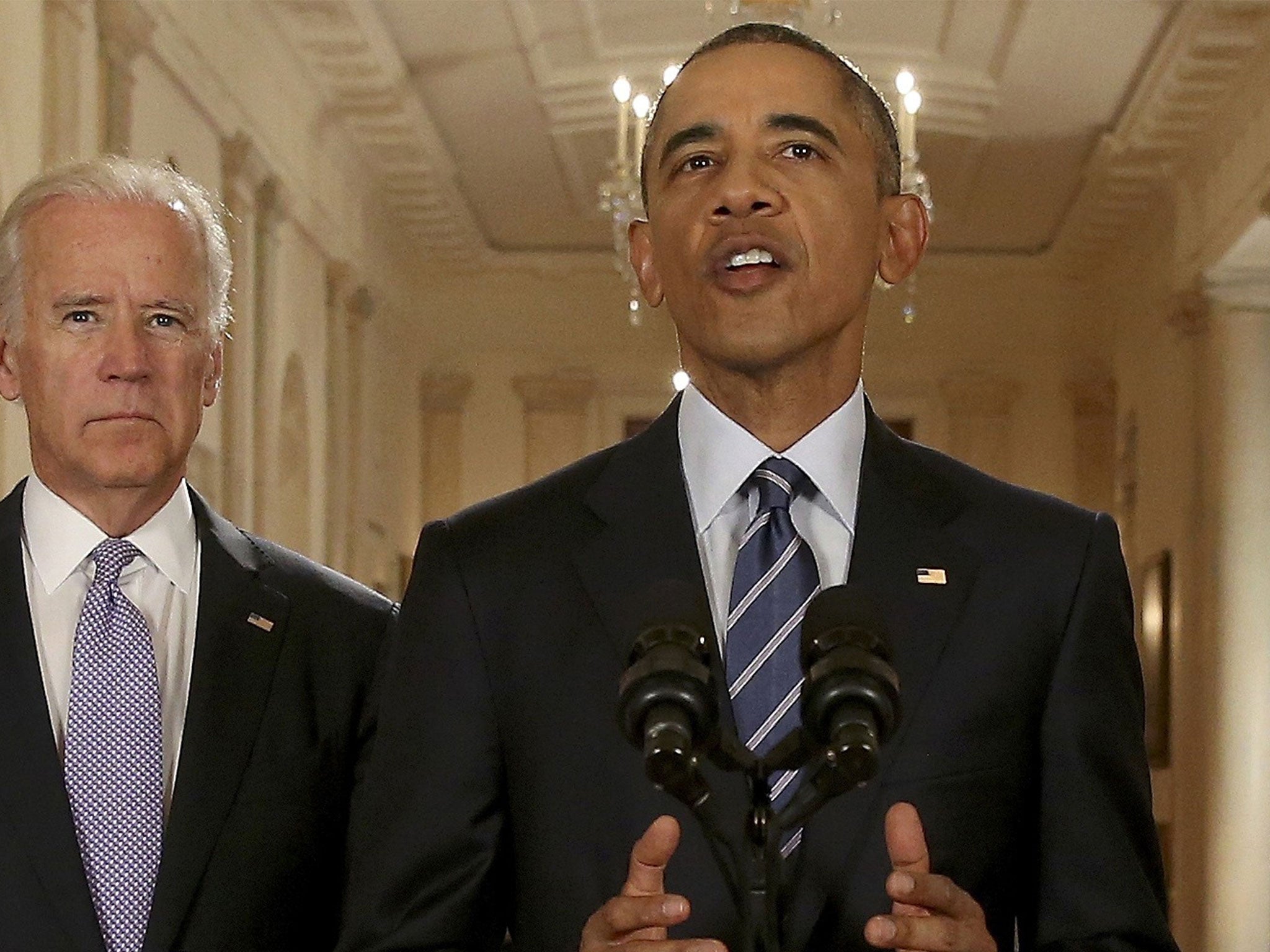US prisons: President Obama's lasting legacy will be penal reform
Out of America: Expectations were low for the President's final term, but his overhauling of the failing justice system is a landmark achievement


Your support helps us to tell the story
From reproductive rights to climate change to Big Tech, The Independent is on the ground when the story is developing. Whether it's investigating the financials of Elon Musk's pro-Trump PAC or producing our latest documentary, 'The A Word', which shines a light on the American women fighting for reproductive rights, we know how important it is to parse out the facts from the messaging.
At such a critical moment in US history, we need reporters on the ground. Your donation allows us to keep sending journalists to speak to both sides of the story.
The Independent is trusted by Americans across the entire political spectrum. And unlike many other quality news outlets, we choose not to lock Americans out of our reporting and analysis with paywalls. We believe quality journalism should be available to everyone, paid for by those who can afford it.
Your support makes all the difference.Did anyone say “lame duck”? This was supposed to be when Barack Obama hit rock bottom, in the final stages of his second term, with the Republicans in complete control of Congress, attention switching to the next battle for the White House in 2016, and a President reduced to virtual irrelevancy. The perfect season, in short, for limping waterfowl.
Instead, the past couple of months have been among his best in office. Congress granted him sweeping powers to negotiate trade deals with Europe and Asia. The Supreme Court saved his healthcare reforms, the signature achievement of his first term, and for good measure made same-sex marriage the law of the land, a step supported by the administration. As for the Republicans in Congress, they’re all over the shop, split between pragmatists who want to get things done and Tea Party zealots.
Capping it all, after years of painstaking negotiations, the “lame duck” secured an agreement to limit Iran’s nuclear programme. The deal may go wrong: Tehran may yet end up with the bomb. But for once the epithet “historic” truly applies. And now another landmark achievement beckons: bipartisan legislation on sentencing and prison reform that would overhaul the US justice system and help correct arguably the country’s greatest social injustice.

America accounts for 5 per cent of the world’s population and 25 per cent of its prison population. It wasn’t always like that. In the late 1970s, the US jailed about the same proportion of its citizens as other advanced countries. Then several things happened.
Various “experts” concluded that rehabilitation of prisoners simply wasn’t working. Recidivism was soaring – ergo, build more prisons and hand down longer sentences to solve the problem. A sharp increase in violent crime, not least crimes involving drugs, added weight to this theory.
Laws were passed by Congress and various states stiffening sentences, including those for relatively minor drug offences, as well as the infamous “three strikes and you’re out” provision for repeat offenders. When I first arrived in Washington in 1991, “law and order” was the hot-button issue of the day. Three years later, Bill Clinton signed a bill that tightened the screws further.
The results are there for all to see: a 500 per cent jump in the total of federal and state prison inmates since 1980, compared with an overall population increase of 46 per cent. Needless to say, the measures bore down on the black population with particular severity: for every two African-Americans at university today, there is one behind bars. But however many prisons were built, they couldn’t keep up with the demand. Hence rampant overcrowding, and the overuse of solitary confinement for prisoners deemed troublesome or mentally impaired.
But in 2015, the picture is transformed. Violent crime rates are back where they were in the early 1970s. Wholesale incarceration is doubtless one reason for the decline. But there are others: an ageing population, ever more ubiquitous security (and mobile phone) cameras, more effective policing techniques, and conceivably even the removal of lead – known to cause lower IQs and other behavioural abnormalities – from paints and petrol.
To be fair, several states have already acted to reduce their prison populations, even some in the South, traditionally the region most wedded to “law and order”. Compassion may be part of the explanation. But so too is simple economics. Keeping a petty drug offender behind bars costs $30,000 a year. Multiply that by a few thousand, and you’re talking real money – money that would be far better used improving schools and helping freed prisoners reintegrate into society.
But states alone can do only so much. No trumpet matches that of the president, and Obama has been blowing his non-stop. On Monday, he commuted the sentences of 46 non-violent drug offenders, some of them serving sentences of 20 years or more. The next day he went before the NAACP, America’s most venerable civil rights group, to denounce a justice system “skewed by race and wealth”, and urge an end to minimum sentencing for non-violent drug crimes. As for solitary confinement and prison rape, they had “no place in a civilised country”.
Then on Thursday, he did what no US president has done before him, and stepped inside a federal jail. True, the El Reno Correctional Institution in El Reno, Oklahoma is no “super-max” for the “worst of the worst”. But the symbolism of the occasion was powerful enough. For 45 minutes he sat down with half a dozen inmates. “There but for the grace of God…” said the President, who has admitted using marijuana and trying cocaine as a student. The difference was, he noted, that thanks to strong family and community support, he found his way to Harvard Law School – not El Reno jail, or worse.

But the really heartening news is that something may actually happen, even in polarised Washington. Among conservatives, support is widespread. House Speaker John Boehner backs reform. So do even the Koch brothers, Charles and David – normally Exhibits A and B in Democratic demonology, as ruthless industrialists pouring billions into Republican efforts to regain the White House.
Other backers include several GOP presidential contenders, notably Rand Paul and Chris Christie. As for Democrats, they are united behind their President. Hillary Clinton urges an end to the “incarceration generation”, and her husband admitted that the 1994 law he signed was a mistake.
And there’s even a draft bill in the House of Representatives, called Safe (the Safe, Accountable, Fair and Effective Justice Act) that would reduce punishment for minor drug offenders, allow judges discretion in sentencing and use money saved for giving prisoners a real chance of rehabilitation. Safe isn’t perfect, but it or something akin to it has a real chance of passage. Not bad for a lame duck.
Join our commenting forum
Join thought-provoking conversations, follow other Independent readers and see their replies
Comments